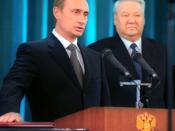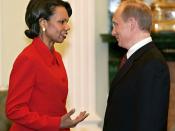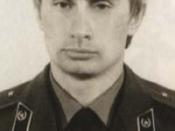POL 332 Putin Debate As Russia struggles with the instability of their democracy, the impact that the leaders have on the current structure and on Russia's future is unknown. "Putin has so far strengthened his presidential power. We do not know how he will apply this power. He is close to conservatives and advocates tough authority. He is not much of a democrat and he is skeptical about democracy. I cannot give a precise definition but it seems to resemble Gaullist ideology" (Vladimir Ryzhkov: Independent Deputy of the Duma). This instability is largely due to the fact that it is unclear as to the path that Putin will choose: democratic or authoritative. Given the background of Putin and his lack of democratic knowledge, he is leaning towards authoritarianism thus favoring a strong state to rule over the Russian people.
The first and most notable example of Putin's lack of a democratic mentality is his history and his involvements in the Soviet structures that lead many critics to say that the KGB is sitting in the President's chair.
Given Putin's fifteen-year voluntary employment in the KGB and his experiences as a Soviet spy, it is clear that his actions are driven by secrecy, inaccessibility, and non-transparency. In addition, he was educated in a St. Petersburg University that was a training ground for Soviet political elite. "Secrecy has been a constant theme in Putin's career. The portrait that emerges from people that have worked with Putin is of a highly disciplined professional who claims to support Western ways, but whose actions point to a preference for state interference" (Matloff: Christian Science Monitor). At the time that Putin took office, the Chechen conflict was at its height and the Russian state had badly deteriorated. The choice to uphold Putin's succession to the...


